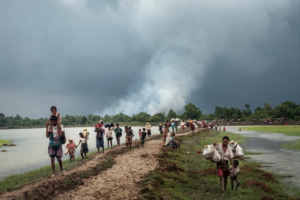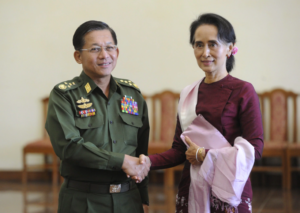This Article was published in Huffington Post on September 22, 2017 and is Co-Authored by US Ambassador Osman Siddique & Samier Mansur

As world leaders converged upon New York City for this week’s UN General Assembly, over 420,000 Rohingya refugees traversed the monsoon rains and bloodied fields of Myanmar into Bangladesh’s make-shift and overcrowded refugee camps. Their malnourished and disfigured bodies tell the stories of starvation, torture, and rape at the hands of Myanmar’s security forces since the latest round of violence broke out three weeks ago.
For those who weren’t able to flee in time, their bullet riddled bodies (including those of children) have washed up on the banks of the Naf River, a natural border between the two nations. Since late August, thousands of Rohingya homes have been razed to the ground, and between 1,000-3,000 have been killed in what the UN, Amnesty International, and Human Rights Watch have all called in stark terms, nothing short of “ethnic cleansing.”
Any hope that Nobel Peace Laureate and de-facto head of state, Aung San Suu Kyi will intervene to halt the violence diminishes by the day. World leaders, including fellow Nobel laureates have appealed to her to help end the violence, yet despite overwhelming evidence to the contrary she has labeled the coverage “fake news”. This blanket denial has provided Myanmar’s powerful military leadership the necessary political cover to carry out what observers are calling the final stages of a “slow-burning genocide” against the Rohingya population.
Four decades of systematic and sustained persecution have rendered the Rohingya the world’s most persecuted minority, and the world’s largest stateless group. Almost half of their total population is now dispersed as refugees around the broader region. These developments have escalated what was once an internal conflict into a global concern.

The US can play a more engaged role in this unfolding situation. While this week’s announcement of a $32 million aid package combined with an appeal for peace by the State Department is a good start; the US has specific specific humanitarian, political, security, and economic interests to take on a more sustained and assertive role to help bring about a sustainable resolution to the issue.
First, at a time when US global leadership has been questioned by the international community, a more engaged response to the Rohingya issue would reinforce the US’ values-driven commitment to a rules-based order. There is no better opportunity to demonstrate this than at the heels of the UNGA where Vice President Mike Pence rightly said on the matter, “Keeping the peace requires more than peacekeeping — it requires action, reform, and lastly it also requires a willingness to call out senseless attacks on innocent people around the world.” It’s time to walk that talk.
Second, the US and the world community have vested interests in a politically stable and democratic Myanmar. Suu Kyi’s inability to intervene in the current crisis is a clear indication that national authority remains beyond her control. The ongoing maltreatment of minorities at the hands of the military and political leadership runs contrary to pluralistic and democratic values. Not only do they stifle democratic gains that the US has long supported in the region, they firmly entrench Myanmar’s military junta as the ultimate power broker of the nation.
Third, the current situation has the potential to inflame internal and regional hostilities. Over the last 50 years, the Rohingya have been denied the most basic of human rights. Last month, the Anann Commission accurately diagnosed that unless the “legitimate grievances” of the Rohingya people are addressed, they will become increasingly prone to radicalization. Once the current humanitarian phase is over, there is high risk of the situation unfolding into a cross-border security concern.
Bilateral tensions have also flared with Bangladesh bearing the burden of Myanmar’s aggressive military campaign. The small nation has absorbed — in an unprecedented display of humanitarian concern — the economic and social impact that comes with hundreds of thousands of fleeing refugees. Further escalation comes from Myanmar’s repeated violations of Bangladesh’s air space with its helicopters and drones. The current situation is not sustainable. An expeditious resolution can help prevent the deterioration of regional relations, radicalization along the border, and miscalculation among security forces of both nations.

Fourth, Myanmar’s economic potential makes it a valuable partner in the region. World powers are attracted to its vast energy reserves, access to a new 50-million-person market in the process of reform, and geographic link to the Indian Ocean — one of the world’s busiest hubs of international trade. Despite this potential, the reality is that no nation — not even Myanmar — will be able to realize these benefits if it continues to choose a path of internal conflict and regional destabilization.
As we speak 15,000 refugees continue to cross the border daily. If there is a lesson to be learned from recent history’s experiences with ethnic cleansing — from Darfur, Kosovo, Rwanda, and Bangladesh — it is this: condemnations, unless backed with concrete action have the tendency to fall on deaf-ears; or worse, quicken the pace of brutality and devastation.
Nearly 50 years ago the US turned a blind eye as approximately 2-3 million Bangladeshis were massacred in a genocide launched by its Cold War ally, Pakistan. The people of South Asia have not forgotten this sad episode; and the US has the opportunity to set the record straight when it comes to its moral power and commitment to human rights in the region.
There are four steps the US can take in this regard: 1) Keep sustained pressure on Naypyidaw to end hostilities, and allow in humanitarian observers into Rakhine province to maintain the peace; 2) Offer to mediate bilateral talks between Bangladesh and Myanmar to support a safe, orderly, and expeditious repatriation of all Rohingya refugees who have fled the violence (not just those whom Myanmar considers its citizens); 3) Call for official recognition of the Rohingya as protected citizens of Myanmar; and 4) Ensure Myanmar’s commitment to implement the Annan Commission, which contains meaningful long-term recommendations for peace and national inclusion of the Rohingya people.
Time is of essence, and there are enough pressing interests for US to take a firm stand against ethnic cleansing and help set a trajectory for lasting peace and stability in the region.

